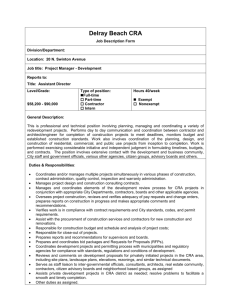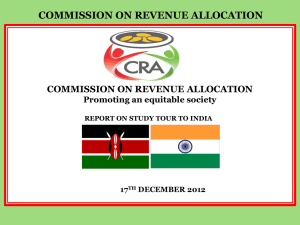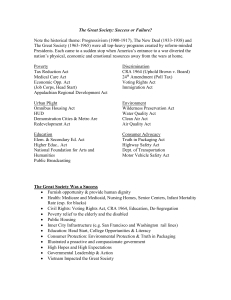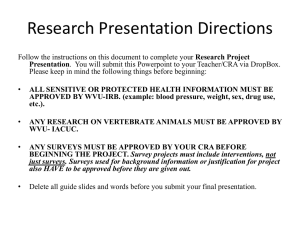Summary of a Consumer's Rights Under the Fair Credit Reporting Act
advertisement
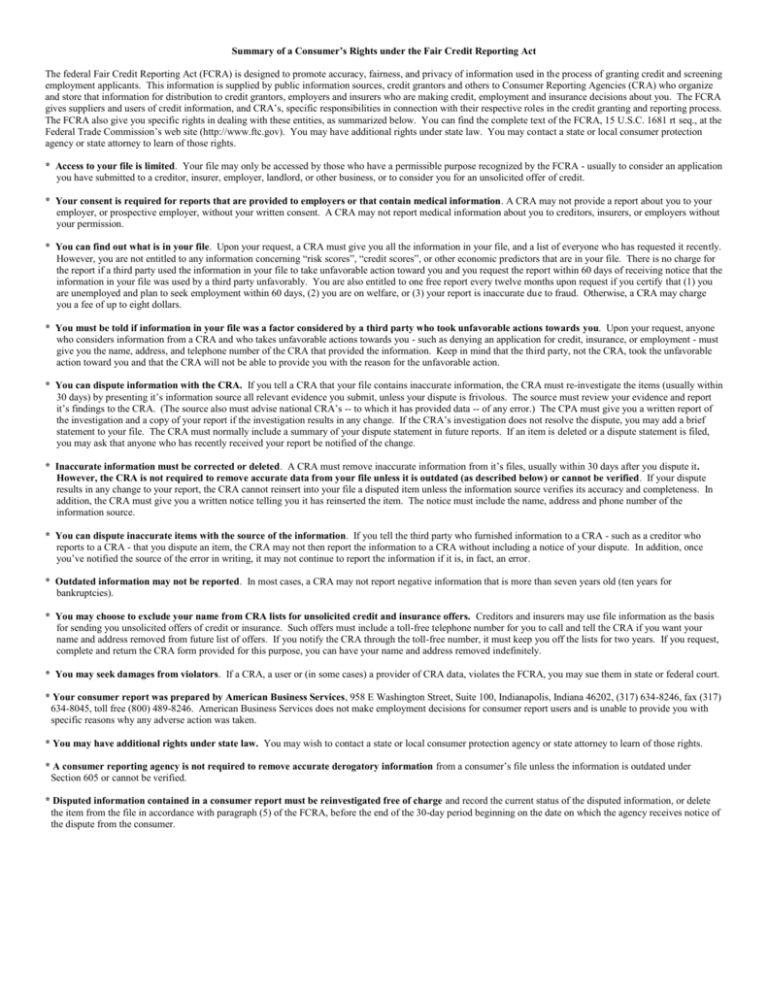
Summary of a Consumer’s Rights under the Fair Credit Reporting Act The federal Fair Credit Reporting Act (FCRA) is designed to promote accuracy, fairness, and privacy of information used in the process of granting credit and screening employment applicants. This information is supplied by public information sources, credit grantors and others to Consumer Reporting Agencies (CRA) who organize and store that information for distribution to credit grantors, employers and insurers who are making credit, employment and insurance decisions about you. The FCRA gives suppliers and users of credit information, and CRA’s, specific responsibilities in connection with their respective roles in the credit granting and reporting process. The FCRA also give you specific rights in dealing with these entities, as summarized below. You can find the complete text of the FCRA, 15 U.S.C. 1681 rt seq., at the Federal Trade Commission’s web site (http://www.ftc.gov). You may have additional rights under state law. You may contact a state or local consumer protection agency or state attorney to learn of those rights. * Access to your file is limited. Your file may only be accessed by those who have a permissible purpose recognized by the FCRA - usually to consider an application you have submitted to a creditor, insurer, employer, landlord, or other business, or to consider you for an unsolicited offer of credit. * Your consent is required for reports that are provided to employers or that contain medical information. A CRA may not provide a report about you to your employer, or prospective employer, without your written consent. A CRA may not report medical information about you to creditors, insurers, or employers without your permission. * You can find out what is in your file. Upon your request, a CRA must give you all the information in your file, and a list of everyone who has requested it recently. However, you are not entitled to any information concerning “risk scores”, “credit scores”, or other economic predictors that are in your file. There is no charge for the report if a third party used the information in your file to take unfavorable action toward you and you request the report within 60 days of receiving notice that the information in your file was used by a third party unfavorably. You are also entitled to one free report every twelve months upon request if you certify that (1) you are unemployed and plan to seek employment within 60 days, (2) you are on welfare, or (3) your report is inaccurate due to fraud. Otherwise, a CRA may charge you a fee of up to eight dollars. * You must be told if information in your file was a factor considered by a third party who took unfavorable actions towards you. Upon your request, anyone who considers information from a CRA and who takes unfavorable actions towards you - such as denying an application for credit, insurance, or employment - must give you the name, address, and telephone number of the CRA that provided the information. Keep in mind that the third party, not the CRA, took the unfavorable action toward you and that the CRA will not be able to provide you with the reason for the unfavorable action. * You can dispute information with the CRA. If you tell a CRA that your file contains inaccurate information, the CRA must re-investigate the items (usually within 30 days) by presenting it’s information source all relevant evidence you submit, unless your dispute is frivolous. The source must review your evidence and report it’s findings to the CRA. (The source also must advise national CRA’s -- to which it has provided data -- of any error.) The CPA must give you a written report of the investigation and a copy of your report if the investigation results in any change. If the CRA’s investigation does not resolve the dispute, you may add a brief statement to your file. The CRA must normally include a summary of your dispute statement in future reports. If an item is deleted or a dispute statement is filed, you may ask that anyone who has recently received your report be notified of the change. * Inaccurate information must be corrected or deleted. A CRA must remove inaccurate information from it’s files, usually within 30 days after you dispute it. However, the CRA is not required to remove accurate data from your file unless it is outdated (as described below) or cannot be verified. If your dispute results in any change to your report, the CRA cannot reinsert into your file a disputed item unless the information source verifies its accuracy and completeness. In addition, the CRA must give you a written notice telling you it has reinserted the item. The notice must include the name, address and phone number of the information source. * You can dispute inaccurate items with the source of the information. If you tell the third party who furnished information to a CRA - such as a creditor who reports to a CRA - that you dispute an item, the CRA may not then report the information to a CRA without including a notice of your dispute. In addition, once you’ve notified the source of the error in writing, it may not continue to report the information if it is, in fact, an error. * Outdated information may not be reported. In most cases, a CRA may not report negative information that is more than seven years old (ten years for bankruptcies). * You may choose to exclude your name from CRA lists for unsolicited credit and insurance offers. Creditors and insurers may use file information as the basis for sending you unsolicited offers of credit or insurance. Such offers must include a toll-free telephone number for you to call and tell the CRA if you want your name and address removed from future list of offers. If you notify the CRA through the toll-free number, it must keep you off the lists for two years. If you request, complete and return the CRA form provided for this purpose, you can have your name and address removed indefinitely. * You may seek damages from violators. If a CRA, a user or (in some cases) a provider of CRA data, violates the FCRA, you may sue them in state or federal court. * Your consumer report was prepared by American Business Services, 958 E Washington Street, Suite 100, Indianapolis, Indiana 46202, (317) 634-8246, fax (317) 634-8045, toll free (800) 489-8246. American Business Services does not make employment decisions for consumer report users and is unable to provide you with specific reasons why any adverse action was taken. * You may have additional rights under state law. You may wish to contact a state or local consumer protection agency or state attorney to learn of those rights. * A consumer reporting agency is not required to remove accurate derogatory information from a consumer’s file unless the information is outdated under Section 605 or cannot be verified. * Disputed information contained in a consumer report must be reinvestigated free of charge and record the current status of the disputed information, or delete the item from the file in accordance with paragraph (5) of the FCRA, before the end of the 30-day period beginning on the date on which the agency receives notice of the dispute from the consumer. The FCRA gives several different federal agencies authority to enforce the FCRA: For Questions or Concerns Regarding: CRA’s, creditors and others not listed below National Banks or Federal Branches/agencies of Foreign Banks Federal Reserve System Member Banks (except National & Federal Branches from above) Savings Associations & Federally Chartered Savings Banks Federal Credit Unions Banks that are State Chartered Air, Surface or Rail Common Carriers regulated by Interstate Commerce Commission Activities subject to the Packers and Stockyards Acts, 1921 To Correct ABS Consumer Report Credit Information Contact Bureau of Consumer Financial Protection 1700 G Street NW Washington, DC 20006 Federal Trade Commission Bureau of Consumer Protection-FCRA Washington, DC 20580 - 312-353-4423 Comptroller of Currency Office Compliance Management, Mail Stop 6-6 Washington, DC 20551 - 202-452-3693 Federal Reserve Board Division of Consumer & Community Affairs Washington, DC 20551 - 202-452-3693 Office of Thrift Supervision Consumer Programs Washington, DC 20552 - 800-842-6929 National Credit Union Administration 1775 Duke Street Alexandra, VA 22314 - 703-518-6360 Federal Deposit Insurance Corporation Division of Compliance & Consumer Affairs Washington, DC 20429 - 800-934-FDIC Department of Transportation Office of Financial Management Washington, DC 20590 - 202-366-1306 Department of Agriculture Office of Deputy Administrator – GIPSA Washington, DC 20250 - 202-720-7051 EXPERIAN 505 City Parkway West Orange, CA 92868 – (888) 397-3742



